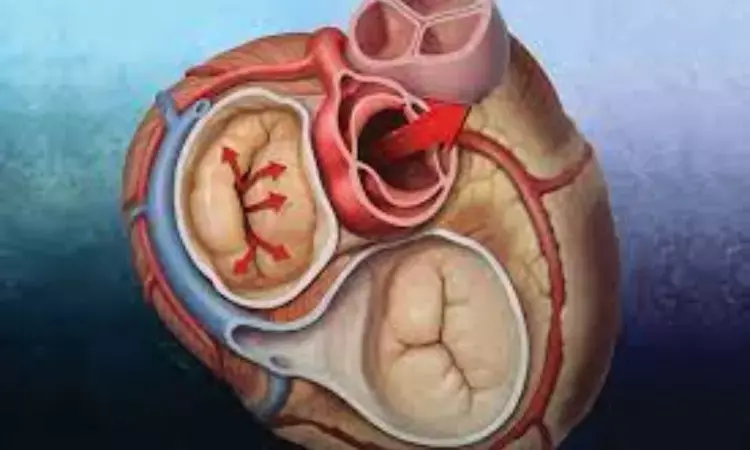- Home
- Medical news & Guidelines
- Anesthesiology
- Cardiology and CTVS
- Critical Care
- Dentistry
- Dermatology
- Diabetes and Endocrinology
- ENT
- Gastroenterology
- Medicine
- Nephrology
- Neurology
- Obstretics-Gynaecology
- Oncology
- Ophthalmology
- Orthopaedics
- Pediatrics-Neonatology
- Psychiatry
- Pulmonology
- Radiology
- Surgery
- Urology
- Laboratory Medicine
- Diet
- Nursing
- Paramedical
- Physiotherapy
- Health news
- Fact Check
- Bone Health Fact Check
- Brain Health Fact Check
- Cancer Related Fact Check
- Child Care Fact Check
- Dental and oral health fact check
- Diabetes and metabolic health fact check
- Diet and Nutrition Fact Check
- Eye and ENT Care Fact Check
- Fitness fact check
- Gut health fact check
- Heart health fact check
- Kidney health fact check
- Medical education fact check
- Men's health fact check
- Respiratory fact check
- Skin and hair care fact check
- Vaccine and Immunization fact check
- Women's health fact check
- AYUSH
- State News
- Andaman and Nicobar Islands
- Andhra Pradesh
- Arunachal Pradesh
- Assam
- Bihar
- Chandigarh
- Chattisgarh
- Dadra and Nagar Haveli
- Daman and Diu
- Delhi
- Goa
- Gujarat
- Haryana
- Himachal Pradesh
- Jammu & Kashmir
- Jharkhand
- Karnataka
- Kerala
- Ladakh
- Lakshadweep
- Madhya Pradesh
- Maharashtra
- Manipur
- Meghalaya
- Mizoram
- Nagaland
- Odisha
- Puducherry
- Punjab
- Rajasthan
- Sikkim
- Tamil Nadu
- Telangana
- Tripura
- Uttar Pradesh
- Uttrakhand
- West Bengal
- Medical Education
- Industry
Malnutrition linked to higher mortality in patients with HF and severe secondary mitral regurgitation

USA: Malnutrition is independently associated with increased 4-year mortality risk but not heart failure (HF) hospitalization in HF patients with secondary mitral regurgitation (SMR), according to results from post hoc analysis of the COAPT trial.
The findings were presented at the annual TVT conference hosted by the Cardiovascular Research Foundation and published in the Journal of the American College of Cardiology.
About 1 of 6 patients with heart failure and severe SMR enrolled in COAPT were affected by poor nutrition status. Transcatheter edge-to-edge repair (TEER) reduced heart failure hospitalization and mortality in patients with and without malnutrition.
The researchers reported that among the 17% of trial participants with a combination of low serum albumin and low BMI indicating malnutrition, 68.3% died within four years compared with 52.8% without malnutrition. Reductions in all-cause mortality and heart failure hospitalization seen with mitral TEER were similar regardless of nutrition status.
Malnutrition is linked with poor prognosis in various diseases, but there is no clear understanding of its prognostic impact in patients with heart failure and SMR. To clarify the same, Andrea Scotti, Cardiovascular Research Foundation, New York, New York, USA, and colleagues aimed to evaluate the impact and prevalence of malnutrition in HF patients with severe secondary mitral regurgitation. They were randomized to TEER with the MitraClip plus GDMT (guideline-directed medical therapy) versus GDMT alone in the COAPT trial.
The researchers calculated baseline malnutrition risk using the validated GNRI (geriatric nutritional risk index) score. Patients were divided as having "malnutrition" (GNRI ≤98) versus "no malnutrition" (GNRI >98). Assessment of the outcomes was done over four years. The primary endpoint was all-cause mortality.
The study led to the following findings:
- Among 552 patients, the median baseline GNRI was 109; 17.0% had malnutrition.
- All-cause mortality at four years was more significant in patients with vs those without malnutrition (68.3% vs 52.8%).
- Using multivariable analysis, both baseline malnutrition (adjusted-HR [adj-HR]: 1.37) and randomization to TEER plus GDMT compared with GDMT alone (adj-HR: 0.65) were independent predictors of 4-year mortality.
- In contrast, GNRI was unrelated to the 4-year rate of heart failure hospitalization (HFH), although TEER treatment reduced HFH (adj-HR: 0.46).
- The reductions in death and heart failure hospitalization with TEER were consistent in patients with and without malnutrition.
Limitations of the analysis were that malnutrition was not prespecified as a subgroup, and the findings might not generalize to a non-COAPT-like population. Repeat albumin levels were not available for enough patients to evaluate.
Reference:
Journal of the American College of Cardiology. Scotti A, et al. "Impact of malnutrition in patients with heart failure and secondary mitral regurgitation: The COAPT trial" J Am Coll Cardiol 2023; DOI: 10.1016/j.jacc.2023.04.047.
Dr Kamal Kant Kohli-MBBS, DTCD- a chest specialist with more than 30 years of practice and a flair for writing clinical articles, Dr Kamal Kant Kohli joined Medical Dialogues as a Chief Editor of Medical News. Besides writing articles, as an editor, he proofreads and verifies all the medical content published on Medical Dialogues including those coming from journals, studies,medical conferences,guidelines etc. Email: drkohli@medicaldialogues.in. Contact no. 011-43720751


